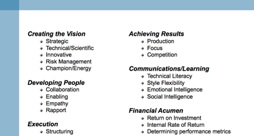 The business competencies described in the SciPhD training course are some of the most important basic capabilities that industry hiring personnel look for in prospective employees. Throughout the course we map your own science experiences to these competencies so that you can relate your science education to talents that are considered valuable and important in industry.
The business competencies described in the SciPhD training course are some of the most important basic capabilities that industry hiring personnel look for in prospective employees. Throughout the course we map your own science experiences to these competencies so that you can relate your science education to talents that are considered valuable and important in industry.
What happened to the Virtual Career Center?
With the release of Flamingo, SciPhD now provides a more integrated system for helping you figure out what kind of job you want, how to prepare for the job, analyze a job ad, and develop a targeted resume. The content that was available in the Virtual Career Center has been integrated into Flamingo, and so the VCC itself has been retired.
If you have purchased videos from the VCC, contact us at flamingo@sciphd.com and we will issue you a credit for the full amount you paid, towards a permanent license for Flamingo.
Who is SciPhD for?
 This site is aimed at helping science professionals such as graduate students, postdocs and research associates make the transition from academic research to the commercial world. This can be one of the most daunting career moves facing science professionals and you need to be able to express your current skills in a language and manner that prospective employers will immediately understand. The SciPhD training course will also help you to identify skills that may need refining so that you can achieve the position you really desire.
This site is aimed at helping science professionals such as graduate students, postdocs and research associates make the transition from academic research to the commercial world. This can be one of the most daunting career moves facing science professionals and you need to be able to express your current skills in a language and manner that prospective employers will immediately understand. The SciPhD training course will also help you to identify skills that may need refining so that you can achieve the position you really desire.
What are business competencies and why are they important?
What is the purpose of writing Experience Statements?
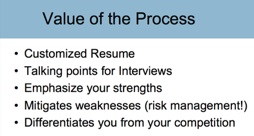 Developing experience statements during this course serves multiple purposes. First, by developing a brief concise statement, this forces you to think carefully about your research experience, how it relates to the competency you are studying, and how adept you are at this competency. The second purpose for developing these experience statements is to provide you with both oral and written “talking points” that you can use in your interviews and resumes when pursuing job opportunities. Although you are instructed to write a one sentence statement, if you require an additional sentence or two to get the critical points across, that is fine. The danger in being too long with your experience statements is that they become unusable in preparing for oral or written statements. Remember, dominating conversation is generally not an effective communications techniques.
Developing experience statements during this course serves multiple purposes. First, by developing a brief concise statement, this forces you to think carefully about your research experience, how it relates to the competency you are studying, and how adept you are at this competency. The second purpose for developing these experience statements is to provide you with both oral and written “talking points” that you can use in your interviews and resumes when pursuing job opportunities. Although you are instructed to write a one sentence statement, if you require an additional sentence or two to get the critical points across, that is fine. The danger in being too long with your experience statements is that they become unusable in preparing for oral or written statements. Remember, dominating conversation is generally not an effective communications techniques.
What if I can't come up with an Experience Statement?
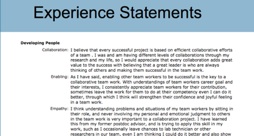 There will likely be some competencies for which you have little to no personal experience. In these cases try to craft a experience statement based on your understanding of the competency after it is explained by the instructor. If you still cannot develop an experience statement, simply enter something like “I can’t develop an experience statement for this competency” in order to advance to the next slide.
There will likely be some competencies for which you have little to no personal experience. In these cases try to craft a experience statement based on your understanding of the competency after it is explained by the instructor. If you still cannot develop an experience statement, simply enter something like “I can’t develop an experience statement for this competency” in order to advance to the next slide.
How do I use my final report?
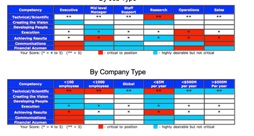 There are three primary uses for your report:
There are three primary uses for your report:
Career Preparation and Insight: We help you look out over the next 15 years and use your next job as a stepping stone to your ultimate career goal. You have a new language of business competencies, and a match of those competencies to job functions, organization types and organization size. You have short-term and long-term training requirements to achieve competencies required for your long term career choices. The goal is to give you a lot of the elements to a career plan and to help make your next job PART OF your career evolution.
A Competency Profile for your career or job search coach: The data you gather from our program will greatly assist any coach you may be using. Be sure to validate the data before you work with a coach. If you are taking this program and have 2 or more years before you job-seek, then make certain you work with a coach to maximize your training opportunities to upgrade your competencies in critical skill areas.
Education and Training: You can take your final report and career goals to work with an education or training advisor in any of the local education facilities in your area. Be sure to include Community Colleges as well as on-line institutions to help in planning what courses will add the most value to your competencies for the job you seek. There are also many resources available in books, guides, webinars, DVDs and more… so use them all to your advantage.
How do you deal with gaps in your scientific work history (for example, I did 1 year as a post doc, then 2 years as a project coordinator. But now I would like to get back into research)?
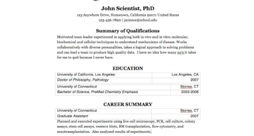 You’ve got to be engaging. Learn everything you can about the company, and the people who you will be meeting (you can ask who you’ll be meeting when setting up your interview schedule). Show genuine interest in the conversation with the interviewer by looking at them when you speak to them and they speak to you. DO NOT INTERRUPT. This is an extremely common mistake we as scientists make. When in a conversation, as soon as someone mentions something, there is an urge to demonstrate your knowledge of that topic. Typically we interrupt, and then go on a monologue. Remember IT”S NOT ABOUT ME!!!! Let the interviewer finish, pause and legitimately think about what they’re saying/asking, and then give a thoughtful succinct response, framing your answer in the context of what is likely most important to the interviewer, not to you (social intelligence). Be prepared for the two deadly questions: “What are your weaknesses?”, and “Do you have any questions for me?”. You need to think about these ahead of time and be prepared to answer. With regard to weaknesses, look carefully at the job description, and identify areas we discussed in the seminar that are clearly important based on the job ad, and that you can improve on. Mention those skills as areas you can improve on and HOW YOU PLAN TO DO THAT. This shows a deep understanding that these skills are important, and a bit of humility in that you recognize your weaknesses. We as scientists tend to be very ego driven which does not play well when trying to get a job.
You’ve got to be engaging. Learn everything you can about the company, and the people who you will be meeting (you can ask who you’ll be meeting when setting up your interview schedule). Show genuine interest in the conversation with the interviewer by looking at them when you speak to them and they speak to you. DO NOT INTERRUPT. This is an extremely common mistake we as scientists make. When in a conversation, as soon as someone mentions something, there is an urge to demonstrate your knowledge of that topic. Typically we interrupt, and then go on a monologue. Remember IT”S NOT ABOUT ME!!!! Let the interviewer finish, pause and legitimately think about what they’re saying/asking, and then give a thoughtful succinct response, framing your answer in the context of what is likely most important to the interviewer, not to you (social intelligence). Be prepared for the two deadly questions: “What are your weaknesses?”, and “Do you have any questions for me?”. You need to think about these ahead of time and be prepared to answer. With regard to weaknesses, look carefully at the job description, and identify areas we discussed in the seminar that are clearly important based on the job ad, and that you can improve on. Mention those skills as areas you can improve on and HOW YOU PLAN TO DO THAT. This shows a deep understanding that these skills are important, and a bit of humility in that you recognize your weaknesses. We as scientists tend to be very ego driven which does not play well when trying to get a job.
Please comment about answering an interview question about "one's weaknesses".
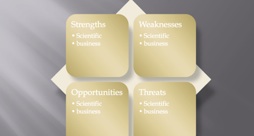 This can be one of the best questions you get asked. If you’ve got a good understanding of the 24 competencies we discussed in the webinar, how they relate to requirements that the company has expressed in their job ad, and now understand enough so that you can express how you will develop those important skills, you can use this question to demonstrate your understanding of the value of soft skills, emphasize the ones that are relevant that you do excel at, and talk about how you intend to improve your competency in the skills that you are weak in, and how by doing so it will have a direct impact on the company. Use social intelligence to mention how your current skill set and plans for improving those skills will benefit the person you’re speaking with, or the part of the company operations that he/she is involved with. I know this sounds like a shameless plug, but taking our self assessment is a great way to get you prepared down this path.
This can be one of the best questions you get asked. If you’ve got a good understanding of the 24 competencies we discussed in the webinar, how they relate to requirements that the company has expressed in their job ad, and now understand enough so that you can express how you will develop those important skills, you can use this question to demonstrate your understanding of the value of soft skills, emphasize the ones that are relevant that you do excel at, and talk about how you intend to improve your competency in the skills that you are weak in, and how by doing so it will have a direct impact on the company. Use social intelligence to mention how your current skill set and plans for improving those skills will benefit the person you’re speaking with, or the part of the company operations that he/she is involved with. I know this sounds like a shameless plug, but taking our self assessment is a great way to get you prepared down this path.
Do you have any suggestions for demonstrating business skills on the resume?
 First identify the skills that are relevant for the job your applying for, and develop a short (1-2 sentences) experience statement that demonstrates your skill. For example, in your Experience section of your Resume, if the job ad talked about working in cross-matrixed teams, you might have a section titled: Effective Performance in Cross-matrixed environments: “Three years managing and leading diverse groups of scientists, technicians and students in order to ensure laboratory projects stayed on track. This often required conflict resolution, innovative planning and developing rapport with all team members.”
First identify the skills that are relevant for the job your applying for, and develop a short (1-2 sentences) experience statement that demonstrates your skill. For example, in your Experience section of your Resume, if the job ad talked about working in cross-matrixed teams, you might have a section titled: Effective Performance in Cross-matrixed environments: “Three years managing and leading diverse groups of scientists, technicians and students in order to ensure laboratory projects stayed on track. This often required conflict resolution, innovative planning and developing rapport with all team members.”